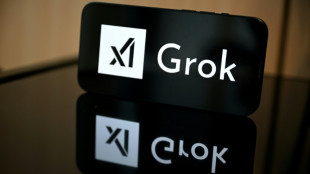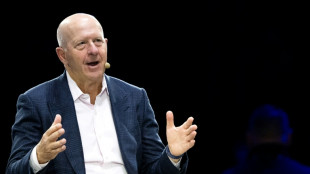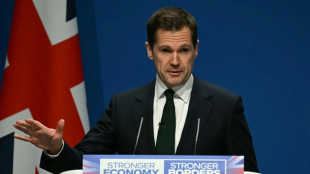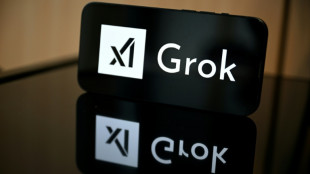
-
 'Gigantic explosion', fire in Dutch city of Utrecht, four hurt
'Gigantic explosion', fire in Dutch city of Utrecht, four hurt
-
Twenty-six charged in latest basketball gambling scandal

-
 Venezuela's Machado meets Trump for 'positive' talks despite snub
Venezuela's Machado meets Trump for 'positive' talks despite snub
-
NBA Europe 'must respect tradition', says commissioner Silver

-
 Thieves steal Pokemon cards in armed robbery at US store
Thieves steal Pokemon cards in armed robbery at US store
-
French Olympic champion Papadakis claims she was under partner's 'control'

-
 Fury over Grok sexualized images despite new restrictions
Fury over Grok sexualized images despite new restrictions
-
US says Iran halts executions as Gulf allies pull Trump back from strike

-
 Frank says Spurs taking 'small steps' in right direction
Frank says Spurs taking 'small steps' in right direction
-
Syrian activist Sarah Mardini acquitted of migrant trafficking in Greece

-
 Goldman Sachs' profits jump on hot merger market
Goldman Sachs' profits jump on hot merger market
-
Platini says Infantino has become 'more of an autocrat'

-
 Scottish Borders, Lake District to grace 2027 Tour de France
Scottish Borders, Lake District to grace 2027 Tour de France
-
Venezuela's sidelined Machado arrives at White House for Trump talks

-
 French mother superior bullied nuns at Paris order: inquiry
French mother superior bullied nuns at Paris order: inquiry
-
Cuba pays tribute to soldiers killed in Maduro capture

-
 UK politician joins hard-right Reform just hours after Tories sack him
UK politician joins hard-right Reform just hours after Tories sack him
-
'Gigantic explosion', fire in Dutch city, four hurt

-
 French mother superior bullied nuns at Paris convent - inquiry
French mother superior bullied nuns at Paris convent - inquiry
-
Deprived of heating, Kyiv enters survival mode to beat big freeze

-
 Oil prices slump after Trump eases concerns over Iran
Oil prices slump after Trump eases concerns over Iran
-
French mother superior bullied nuns in Montmartre: report

-
 Rosenior refuses to back Sanchez as Chelsea number one
Rosenior refuses to back Sanchez as Chelsea number one
-
Harry due to testify to UK court next week in last tabloid case

-
 Trump threatens to invoke Insurrection Act over Minnesota protests
Trump threatens to invoke Insurrection Act over Minnesota protests
-
Niger faces dilemma over uranium shipment stuck at airport

-
 UN chief attacks world leaders putting cooperation on 'deathwatch'
UN chief attacks world leaders putting cooperation on 'deathwatch'
-
Morocco and Senegal prepare for final showdown but Salah's AFCON dream fades

-
 Polls close in Uganda after delays, internet blackout
Polls close in Uganda after delays, internet blackout
-
Forced confession fears as Iran chief justice interrogates protesters

-
 Al-Attiyah closes on sixth Dakar Rally as Ekstrom wins 11th stage
Al-Attiyah closes on sixth Dakar Rally as Ekstrom wins 11th stage
-
Luis Enrique has no doubts about PSG's title credentials

-
 England off-spinner Bashir signs for Derbyshire after Ashes exile
England off-spinner Bashir signs for Derbyshire after Ashes exile
-
Trump convinced 'to give Iran a chance' after threats over protest crackdown

-
 European military mission in Greenland as US aim 'remains intact'
European military mission in Greenland as US aim 'remains intact'
-
UK's Hockney warns moving Bayeux Tapestry would be 'madness'

-
 Senior UK opposition politican sacked over 'plot' to join hard-right party
Senior UK opposition politican sacked over 'plot' to join hard-right party
-
Syrians flee Kurdish-controlled area near Aleppo

-
 Pressure piles on Musk's X to curb sexualised deepfakes
Pressure piles on Musk's X to curb sexualised deepfakes
-
Chinese dissident artist Ai Weiwei debuts in India

-
 Arbeloa must act fast to avert Real Madrid crisis
Arbeloa must act fast to avert Real Madrid crisis
-
Top Bangladesh cricket official sacked amid World Cup row

-
 Iran vows to defend itself as Trump says will 'watch it and see'
Iran vows to defend itself as Trump says will 'watch it and see'
-
Spain hosted record 97 mn foreign tourists in 2025

-
 Ex-Olympic swim champion Agnel to face trial on rape claims
Ex-Olympic swim champion Agnel to face trial on rape claims
-
Danish PM says US ambition to take Greenland 'remains intact'

-
 In remote Senegal, chimp researchers escape gold mines' perils
In remote Senegal, chimp researchers escape gold mines' perils
-
Senegal's spear-wielding savannah chimps yield clues on humanity's past

-
 Russia expels UK diplomat accused of being spy
Russia expels UK diplomat accused of being spy
-
Uganda election hit by delays after internet blackout

| SCS | 0.12% | 16.14 | $ | |
| CMSC | 0.74% | 23.525 | $ | |
| BCC | 2.6% | 86.295 | $ | |
| BTI | 1.12% | 58.09 | $ | |
| RIO | 0.52% | 86.332 | $ | |
| CMSD | 0.22% | 23.96 | $ | |
| BCE | 0.08% | 24.24 | $ | |
| NGG | 0.61% | 79.365 | $ | |
| RBGPF | -0.26% | 81.36 | $ | |
| GSK | -3.4% | 49.12 | $ | |
| JRI | -0.47% | 13.563 | $ | |
| AZN | -2.5% | 93.99 | $ | |
| RYCEF | -1.12% | 16.95 | $ | |
| BP | -1.92% | 35.145 | $ | |
| RELX | -0.14% | 41.86 | $ | |
| VOD | 0.59% | 13.45 | $ |

ALS patient pioneering brain-computer connection
As a rare form of Lou Gehrig's disease paralyses his body, Rodney Gorham hopes a pioneering link between his brain and a computer will help others after he is gone.
The 63-year-old Australian shared his thoughts by using his eyes to pinpoint letters on a screen and "clicking" on words with his mind.
Thanks to an eight-millimetre stent implanted in his brain to detect neural activity, Gorham hopes to continue going online, sending messages and playing video games for a long time to come.
US company Synchron has been testing the "stentrode" for the past two years, getting cleared for human trials before Elon Musk's attention-grabbing Neuralink startup.
Gorham's implant connects to a small receiver and transmitter unit under the skin in his chest, and he credits it with changing his life.
Several years ago, Gorham was diagnosed with ALS, which causes progressive paralysis of the respiratory muscles, trunk, arms and legs.
The disorder is expected to gradually disable his movement, but not to kill him, according to his wife, Carolyn.
"So he could live for another 20 years. So think about if your body didn't move at all, your brain still firing at the same rate," she said.
"And you can't scratch your nose. You can't tell somebody you want to scratch your nose."
The brain implant gives her husband a "slice of life", letting him at least communicate or play a game, Carolyn Gorham added.
Rodney Gorham has given up on video games that require quick reactions typically made with handheld controllers or a computer mouse, but is still playing turn-based ones such as city-building games, according to his wife.
Without the experimental technology, the life of the sports car- and travel-loving former salesman "would be pure torture", Carolyn Gorham said.
- Language of the mind -
Synchron hopes to get approval next year from health authorities to market a final version of the device.
The startup said clinical tests have been conclusive but there is still a lot of work to do, notably in decoding brain signals and translating them into a universal language to command computers.
While eye-tracking tech enables a patient to target icons on a computer screen, the user must think of a motion -- like kicking their foot or making a fist -- to "click" an icon.
The software must be trained to recognise the brain signal that sends the command to the body, but people's minds "speak" in different ways.
Computers need a common neural language to understand the intent no matter who is thinking it, Synchron founder Tom Oxley said from his office in New York.
"That's a very interesting challenge we are facing now," Oxley told AFP.
"Building a system that is not just for one person, but for millions of people."
At his home in Melbourne, Rodney Gorham tells an AFP journalist that he was able to quickly learn to type using his mind.
While going through exercises to tune the software, he moves his feet as instructed. His hand moves an imaginary computer mouse on a tabletop.
At the start of the trial it took about two and a half seconds for Gorham's thoughts to prompt an on-screen click, but now it's a half second, Synchron engineer Zafar Faraz recalled while sitting next to the patient.
- Independence -
Gorham's contribution to improving the brain-computing interface has been "monumental", according to Faraz.
"I don't think we would be anywhere if he hadn't taken the brave step of volunteering and pioneering this technology," Faraz said.
Families of patients testing brain implants proudly compare them to astronauts bravely exploring a new world, said David Putrino, who oversees the stentrode's clinical testing in the United States and is director of rehabilitation innovation at New York's Mount Sinai Health System.
"We select patients who hope to advance science for others more than for themselves," Putrino told AFP.
The doctor sees implants like stentrodes improving overall health of patients whose conditions drastically limit social interaction, leaving them isolated.
"Recent studies show that solitude has the same effect on health as smoking 17 cigarettes a day," Putrino said.
The technology remains far from enabling real conversations, but it gives her husband much-needed autonomy, Carolyn Gorham said.
"Without the software... his life would be torture. I think that's the only way to describe it. It would be hell on earth.
"With this software the freedom that it will give him, just to be able to make decisions and look at things without asking somebody to do it for them. Just that little bit of independence is incredible."
S.Barghouti--SF-PST



